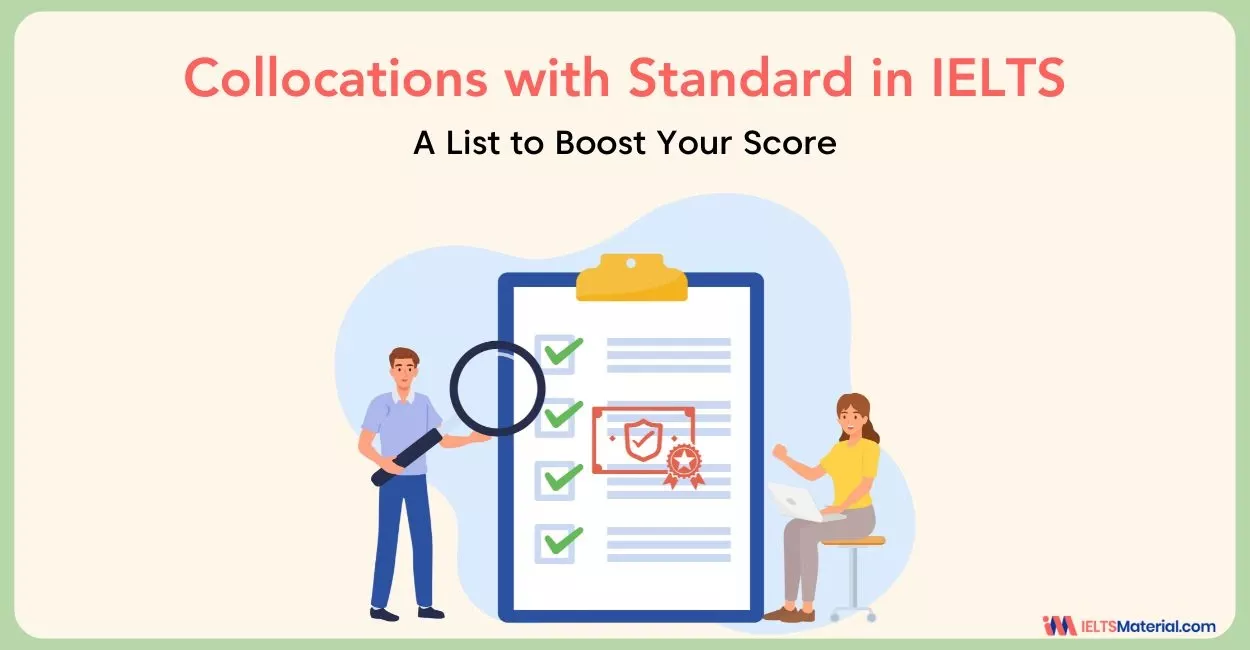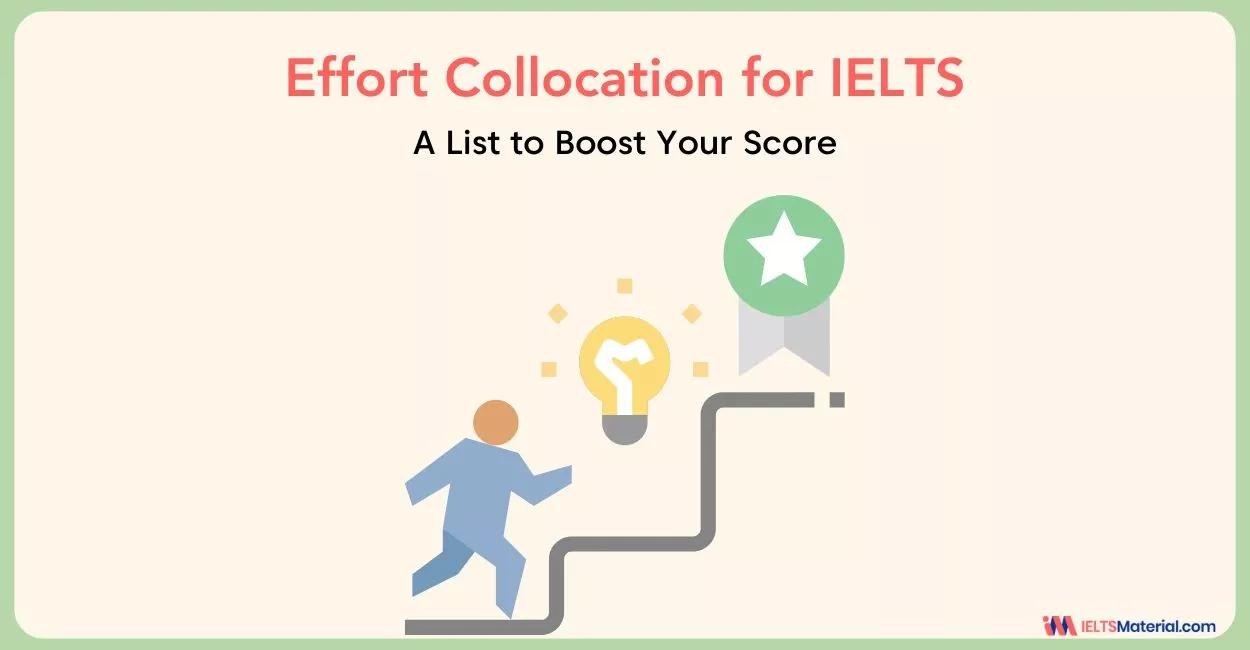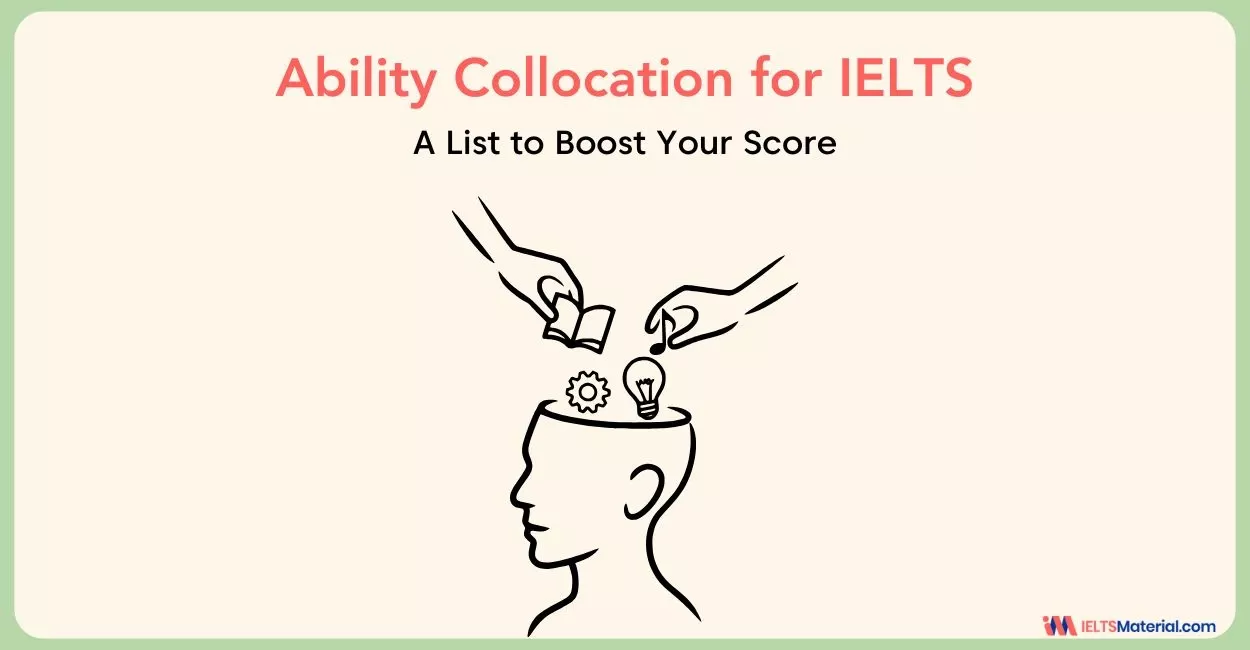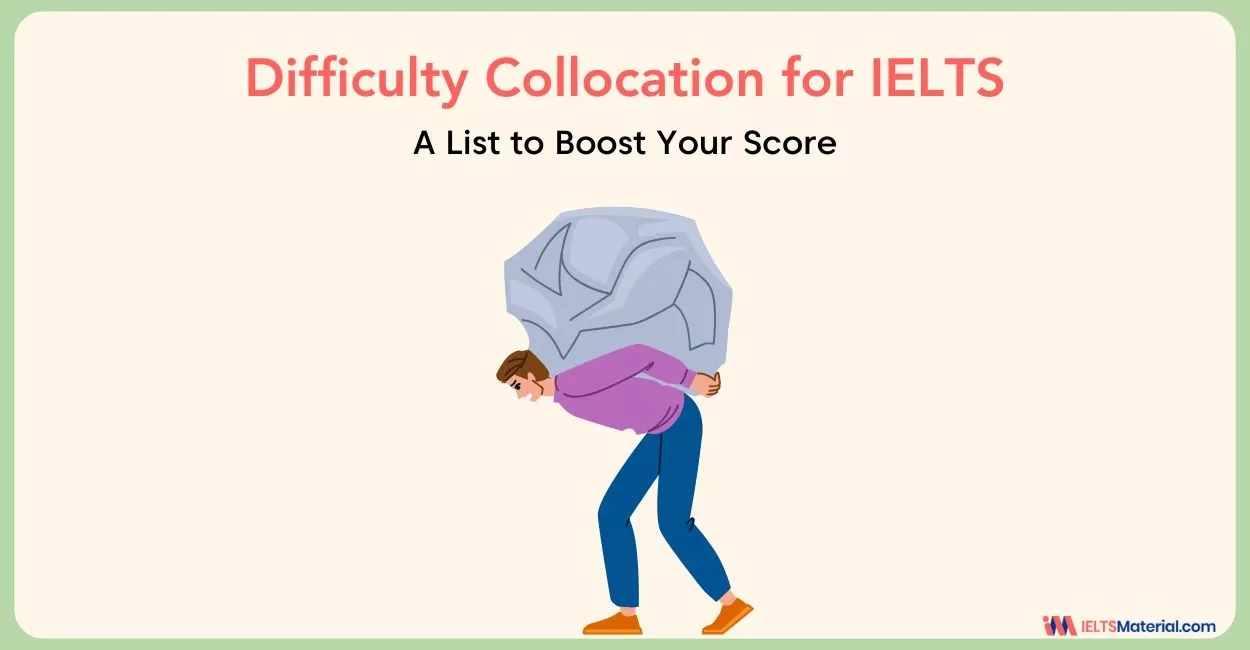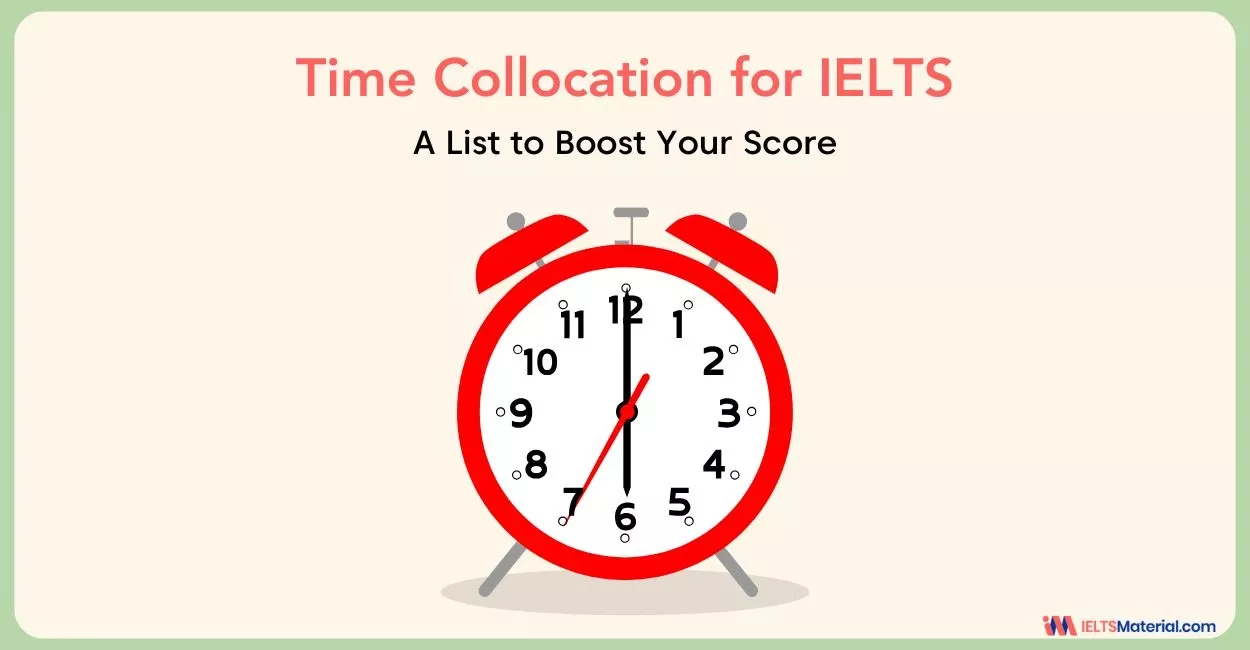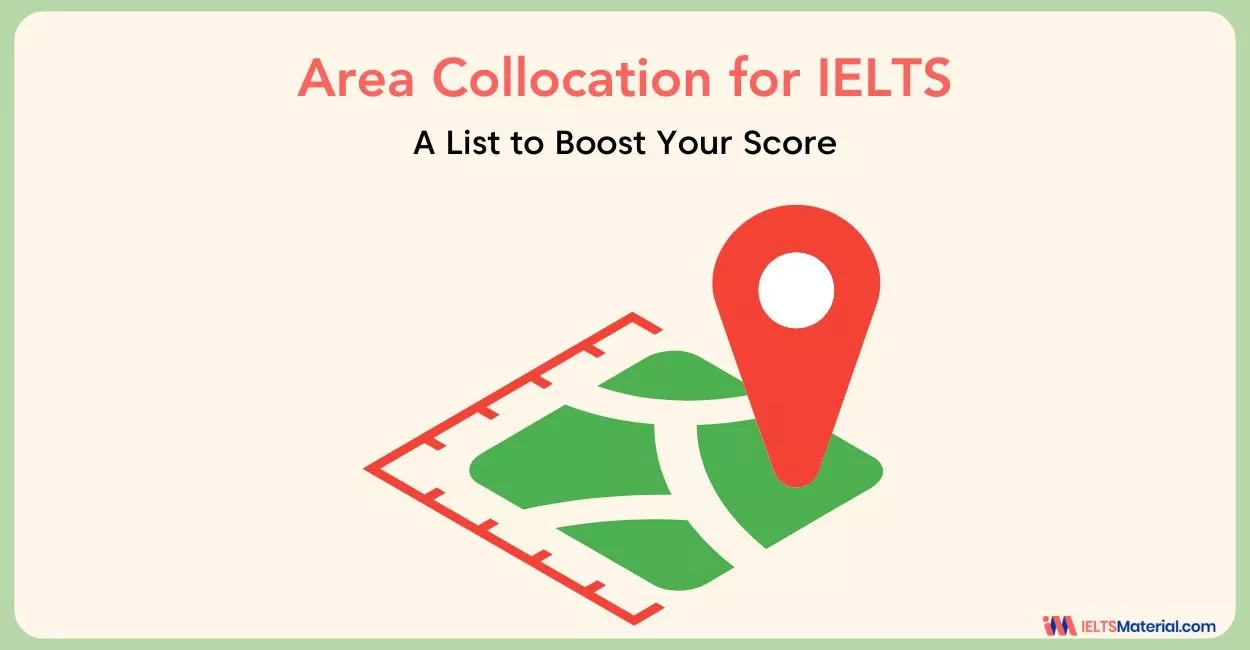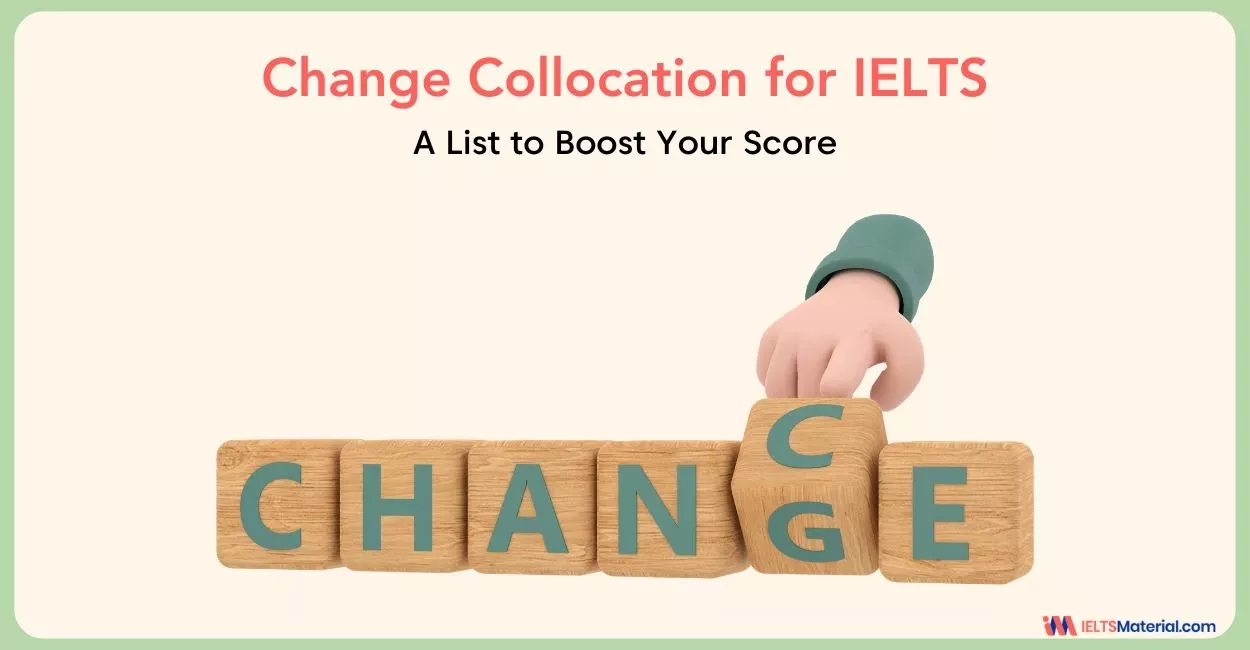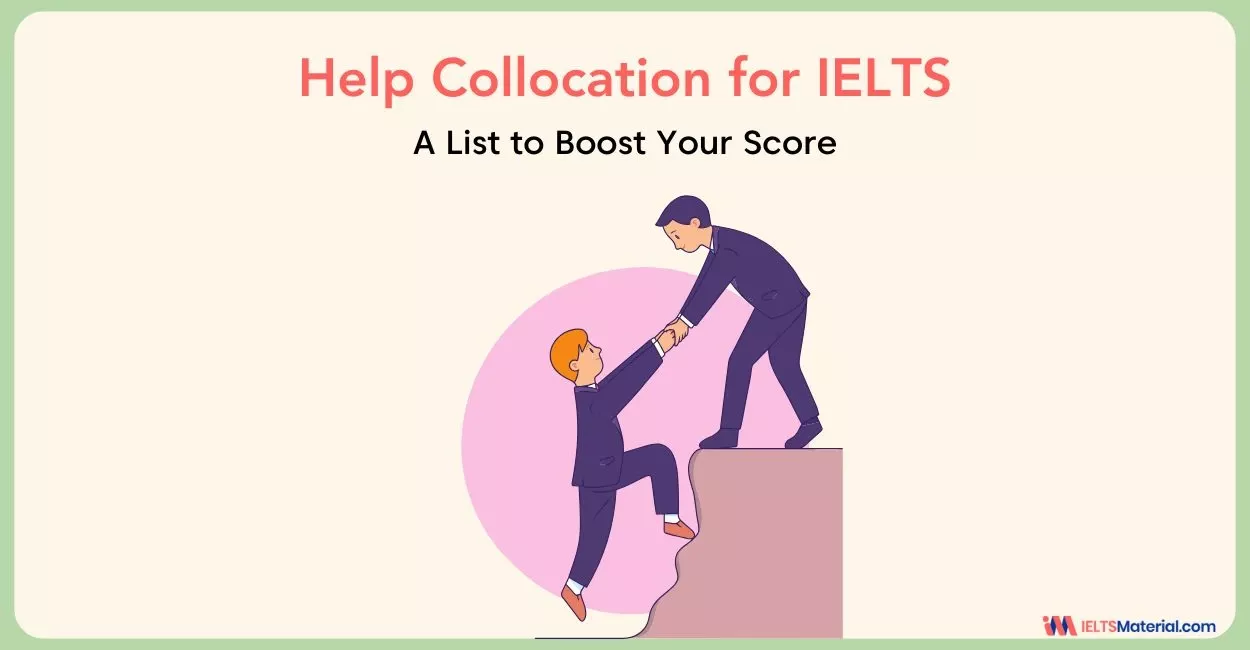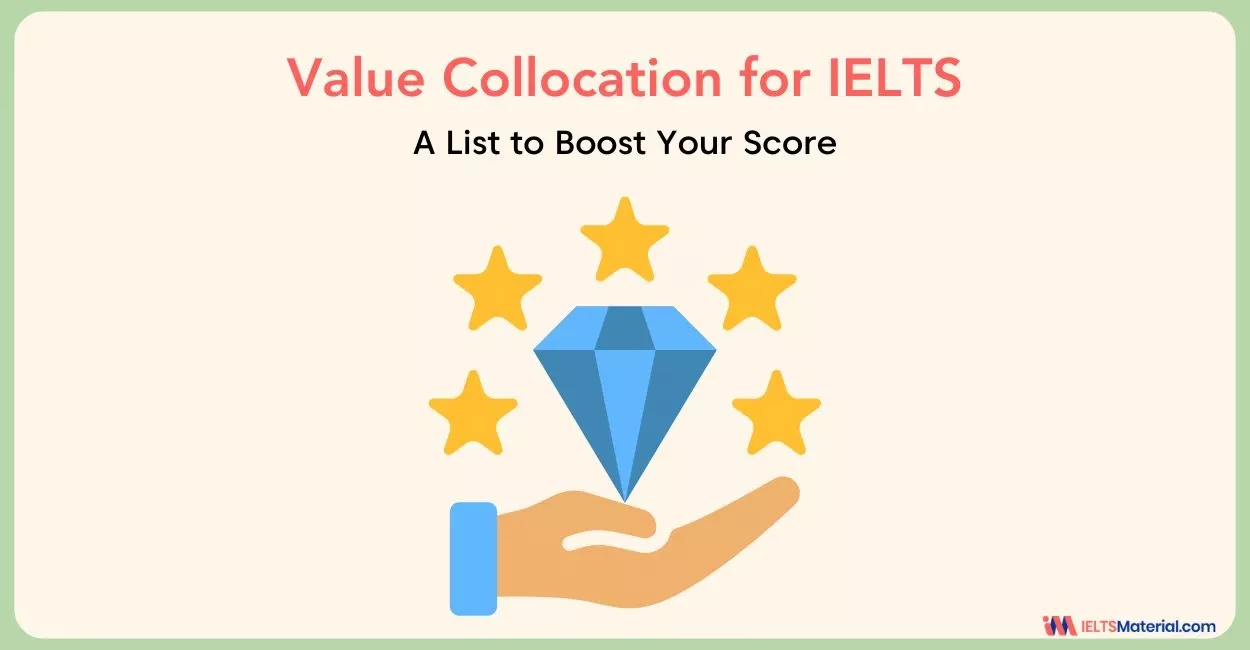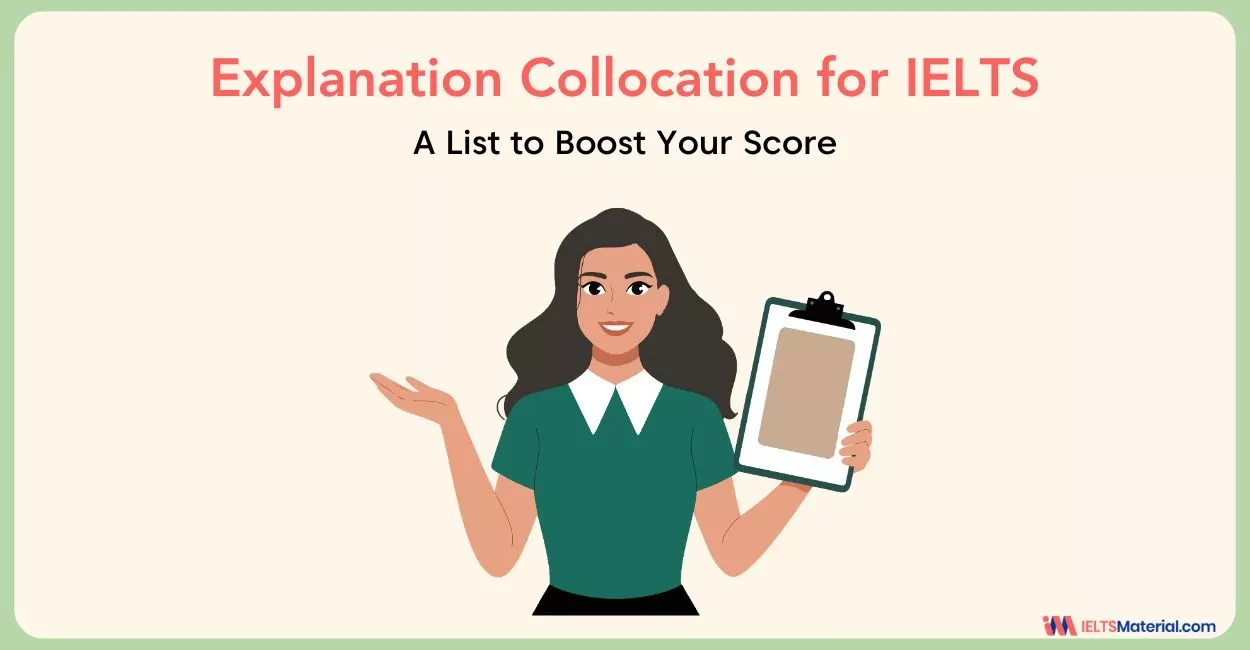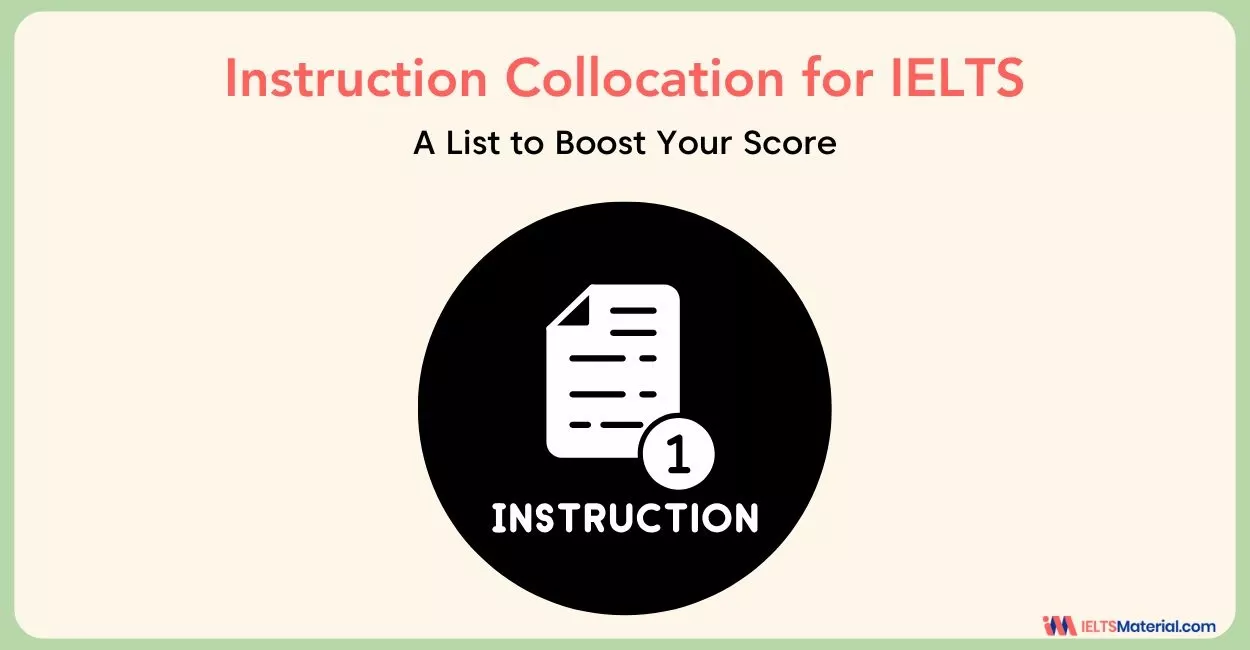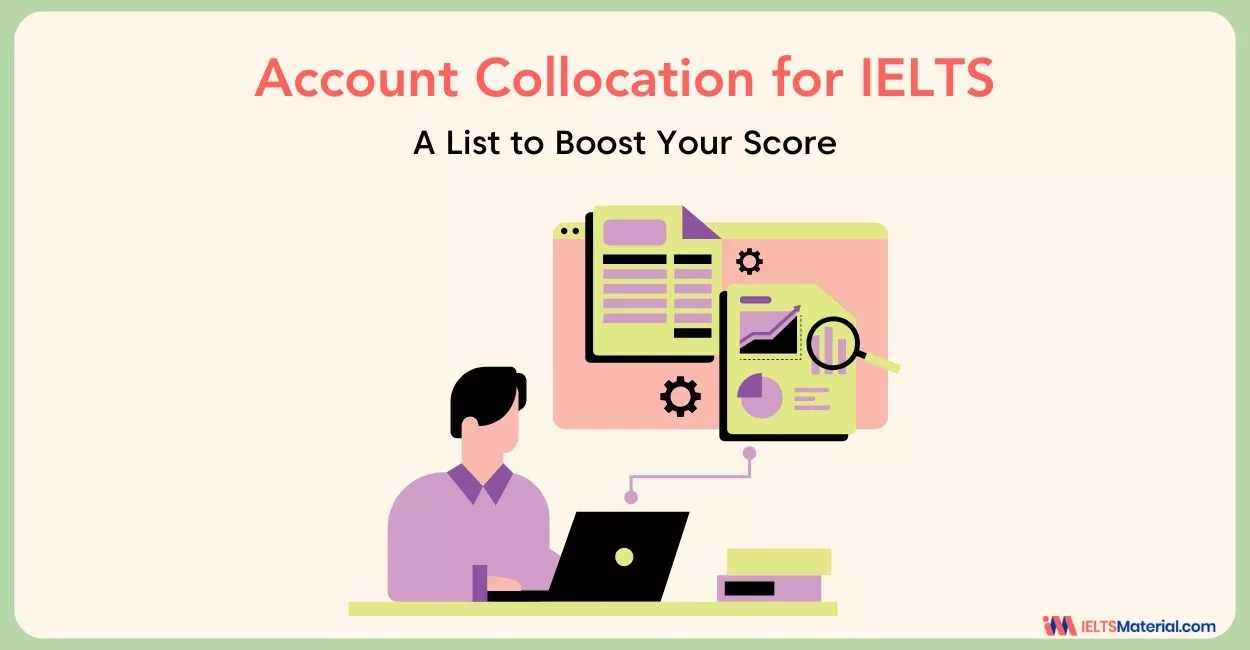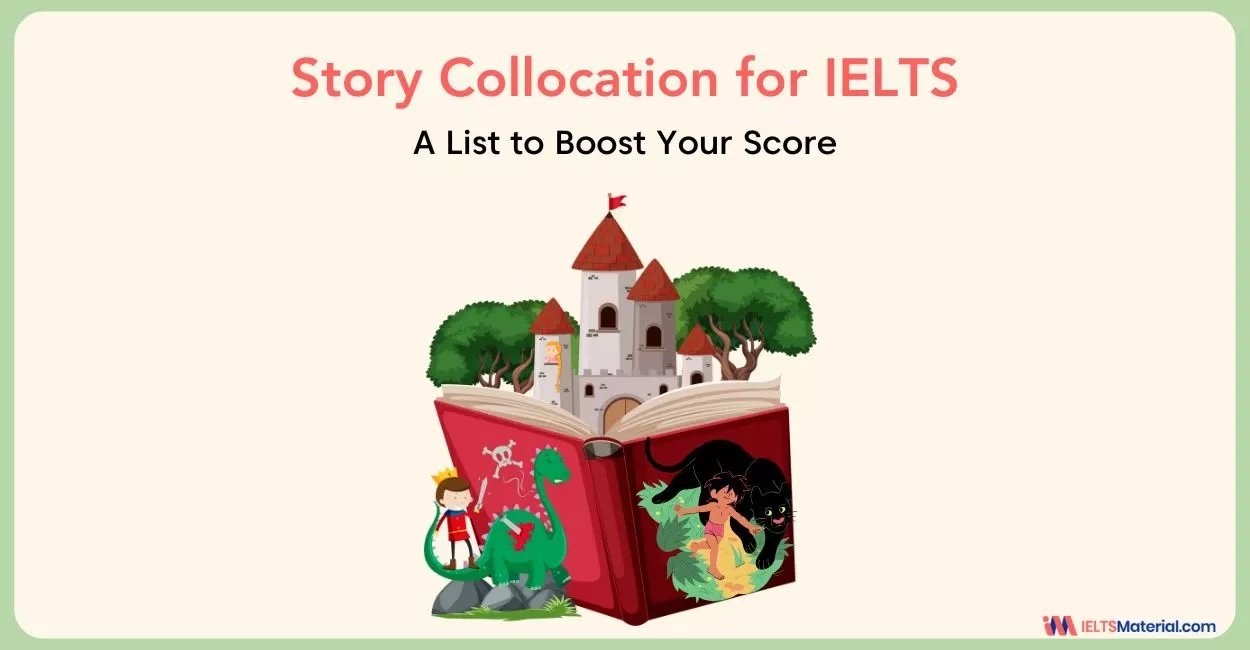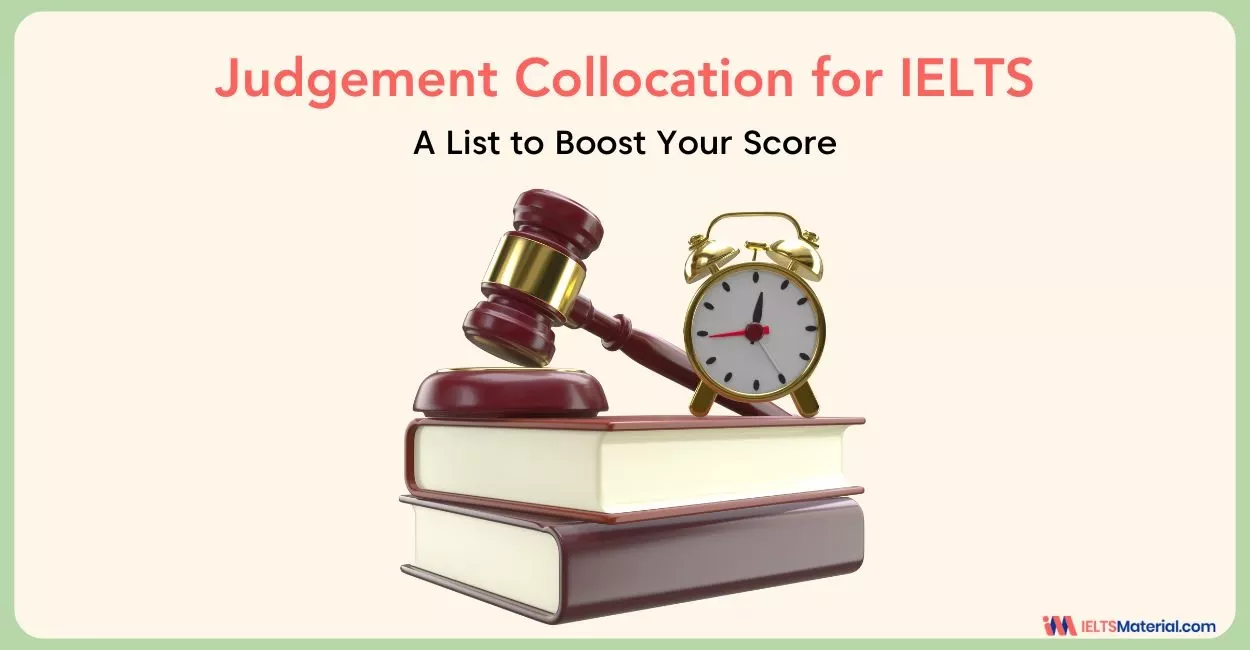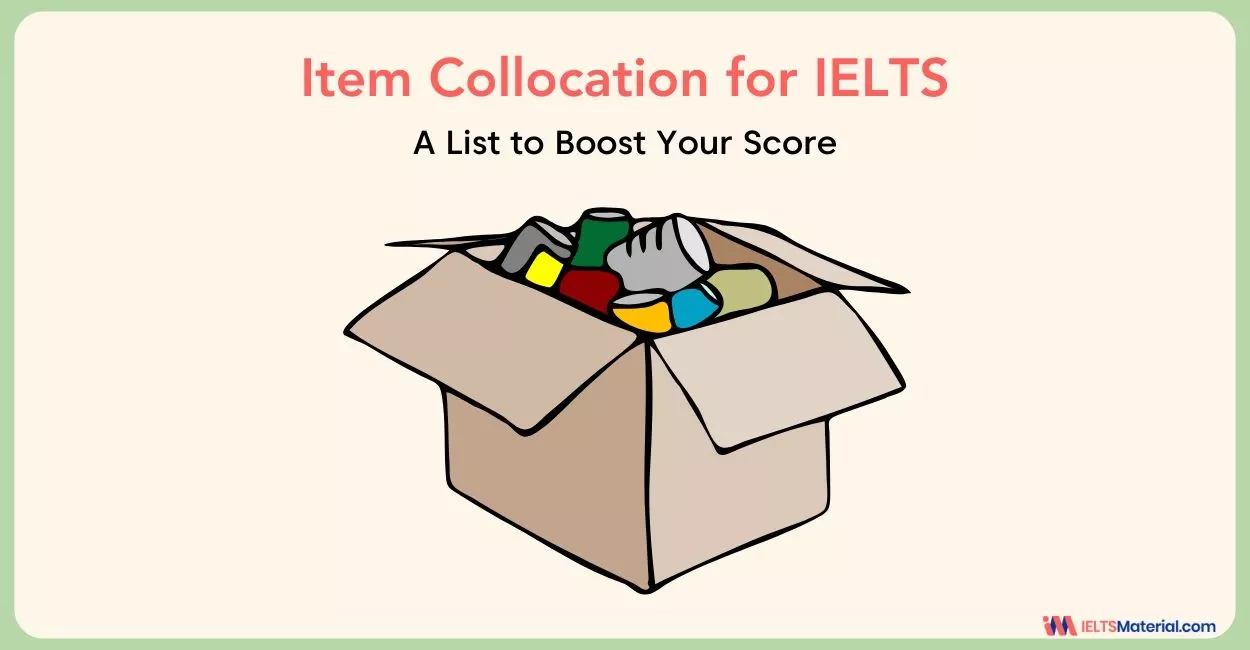Learn more Collocations
Collocations with Standard in IELTS: A List to Boost Your Score
In academic English and IELTS contexts, the word ‘standard’ plays a crucial role in expressing quality, expectations, and comparison. Therefore, understanding and applying accurate collocations with standard in IELTS can significantly enhance coherence, lexical resource, and grammatical accuracy, three key IELTS scoring criteria. In this blog, we will explore various standard collocations, categorized into verbs, adjectives, nouns, prepositions, and other important expressions, to help you enrich your IELTS vocabulary. Lists of Collocations with Standard in IELTS to Boost Your Score When you are describing education, living conditions, or professional practices in IELTS, the way you use standard colloquialisms reflects your ability...

6 min read
Updated On
Effort Collocation for IELTS: A List to Boost Your Score
Expressing hard work, persistence, and determination is essential in the IELTS exam, especially when you are describing your study habits, teamwork, or personal goals. The word ‘effort’ plays a central role in this kind of expression. However, repeating the word can affect your score. So, learning the effort collocation for IELTS is essential. This blog provides a complete guide to top important collocations for IELTS related to effort, including Verb + Effort, Noun + Effort, Adjective + Effort, and Common Expressions with meanings and example sentences for clear IELTS usage guidance. Lists of Effort Collocations for IELTS to Boost Your Score High-scoring...

7 min read
Updated On
Ability Collocation for IELTS: A List to Boost Your Score
The word ‘ability’ frequently appears across topics, from education and work to technology and personal experience, making it versatile. It represents the power, skill, or capacity to do something. However, to express it naturally and accurately, you must use it with the right ability collocations for IELTS. Therefore, in this blog, we will explore different ability collocations with advanced vocabulary word lists for IELTS, categorized into verbs, adjectives, and other useful combinations, to help you enrich your vocabulary. Lists of Ability Collocations for IELTS to Boost Your Score Mastering the ability collocations for IELTS will help you confidently discuss topics about...

6 min read
Updated On
Difficulty Collocation for IELTS: A List to Boost Your Score
In IELTS Writing and Speaking, examiners often look for natural and topic-specific collocations, which are word combinations that native speakers commonly use together. The word ‘difficulty’ is one that appears frequently in IELTS answers, especially when discussing challenges, problems, or obstacles in life, study, or work. However, using difficulty collocations for IELTS correctly requires more than just knowing their meaning. This blog explores powerful and precise difficulty collocations to help you express ideas more naturally and score higher in the Lexical Resource criteria for the overall IELTS band score. Lists of Difficulty Collocations for IELTS to Boost Your Score Using the...

6 min read
Updated On
Time Collocation for IELTS: A List to Boost Your Score
Time is one of the most fundamental yet flexible nouns in English. It’s used to describe experiences, schedules, opportunities, and life stages - all of which appear frequently in IELTS Writing and Speaking. So, the time collocations for IELTS show not just vocabulary knowledge but also collocational accuracy, a key feature of Band 8+ language use. In this blog, we will explore different time collocations, categorized into verbs, adjectives, and other useful combinations, to help you enrich your overall IELTS vocabulary. Lists of Time Collocations for IELTS to Boost Your Score Whether you are writing about time management, leisure activities, or...

9 min read
Updated On
Area Collocation for IELTS: A List to Boost Your Score
The word ‘area’ is very simple yet incredibly versatile in English. From describing geographical spaces (rural areas) to academic fields (area of study), it appears across IELTS Writing and Speaking tasks. Candidates who use ‘area’ accurately with the right verbs, adjectives, and prepositions demonstrate advanced lexical resource and contextual awareness, both of which are crucial for achieving Band 7.0 and above. Therefore, learning area collocations for IELTS along with their correct usage is essential. This blog explores the most common and high-scoring verb + area, adjective + area, and phrases with prepositions, as well as special area collocations with their meanings and...

8 min read
Updated On
Change Collocation for IELTS: A List to Boost Your Score
Change is one of the most powerful and recurring themes in IELTS Writing and Speaking. From environmental change to changes in education, lifestyle, or government policy, this word connects ideas of transformation, progress, and adaptation. As a result, adding change collocations for IELTS band 9 to the academic collocation list is very crucial. In this blog, we will explore lists of change collocations, divided into four key categories with meaning and examples. Moreover, you will get to solve some practice exercises related to the given collocations to help you master what you have learnt here. Lists of Change Collocations for IELTS to...

7 min read
Updated On
Approval Collocation for IELTS: A List to Boost Your Score
The word ‘approval’ and its collocations are perfect to describe how governments approve policies, how society reacts to change, or how people seek validation. Therefore, learning and using approval collocations for IELTS appropriately is essential to improve your vocabulary and boost your lexical resource score. In this blog, we will explore various approval collocations, along with their meanings and usage, so that you can add them to your advanced vocabulary word list for IELTS. Lists of Approval Collocations for IELTS to Boost Your Score In academic writing or discussion, approval carries subtle meanings: social acceptance, official permission, or emotional agreement. However,...

8 min read
Updated On
Help Collocation for IELTS: A List to Boost Your Score
Collocations with help allow you to express support, assistance, and cooperation more naturally. For instance, instead of repeating ‘give help’, native speakers use help collocations like ‘offer help’ or ‘provide assistance’. Similarly, using expressions like ‘in dire need of help’ or ‘ask for professional help’ can make your IELTS Writing and Speaking responses more fluent and sophisticated. In this blog, we will explore different help collocation for IELTS, including ‘Verb + Help’, ‘Types and ways of asking for help’, ‘Adjective + Help’, and prepositional expressions with practical examples to show you exactly how to use them. Lists of Help Collocations...

10 min read
Updated On
Value Collocation for IELTS: A List to Boost Your Score
The word ‘value’ appears frequently in all these themes; sometimes meaning monetary worth, sometimes moral belief, and other times importance or usefulness. In the IELTS exam, particularly in Writing Task 2 and Speaking Part 3, candidates often need to discuss topics related to money, culture, education, ethics, or success. Therefore, learning value collocations for IELTS is essential to not only improve your vocabulary but also boost your band score. In this blog, we will explore different value collocations, categorized into verb, adjective, and other important expressions, to help you enrich your IELTS vocabulary. Lists of Value Collocations for IELTS to Boost...

8 min read
Updated On
Explanation Collocation for IELTS: A List to Boost Your Score
When it comes to scoring high in the IELTS, clarity is a key factor, as examiners look for candidates who can express their thoughts logically and justify their ideas convincingly. As a result, the word ‘explanation’ and explanation collocations for IELTS become your linguistic superpower. They not only mean giving a reason but also reflect understanding, analysis, and clarity of thought. In this blog, we will explore the most important explanation collocations to boost your advanced vocabulary word list for IELTS as well as your band score. Lists of Explanation Collocations for IELTS to Boost Your Score Whether you are justifying an...

9 min read
Updated On
Instruction Collocation for IELTS: A List to Boost Your Score
The word ‘instruction’ goes far beyond the classroom. It appears in contexts ranging from technical manuals and safety guidelines to exam questions and official notices. In IELTS, understanding how to use instruction collocations correctly and fluently can help you describe processes, procedures, and systems, all vital for higher band scores in both IELTS Writing Task 1 (Academic) and Task 2. In this blog, we will explore essential instruction collocations, including verbs, adjectives, and common expressions. You will learn how to use them naturally in essays, speaking answers, and task responses through the given examples and practice exercises. Lists of Instruction Collocations for...

8 min read
Updated On
Answer Collocation for IELTS: A List to Boost Your Score
The word ‘answer’ might seem straightforward. However, this word carries two distinct meanings in English: a reply to a question, remark, or letter and a solution to a problem or challenge. Therefore, understanding and mastering answer collocations can significantly improve your writing, speaking, and even reading and listening scores. This blog explores essential answer collocations for the IELTS exam used by native speakers and examiners, complete with meanings, examples, and practical exercises. Lists of Answer Collocations for IELTS to Boost Your Score The word ‘answer’ appears in all modules of the IELTS exam - from describing opinions to explaining solutions. As a...

8 min read
Updated On
Account Collocation for IELTS: A List to Boost Your Score
The word ‘account’ is a remarkably flexible word that can be used in both academic and daily life contexts. Its usage ranges from explanation, report, financial record, to perspective. However, repetitive usage of the same word can affect your lexical resources score. As a result, you must add various account collocations for IELTS success. Therefore, in this blog, we will explore various account collocations with advanced vocabulary word lists for IELTS, categorized into verbs, adjectives, and other useful expressions, to help you enrich your vocabulary. Lists of Account Collocations for IELTS to Boost Your Score Collocations make your speech and writing...

8 min read
Updated On
Excuse Collocation for IELTS: A List to Boost Your Score
In everyday communication and especially in IELTS Speaking, we often need to explain, justify, or apologise for something. That is where the word ‘excuse’ becomes powerful. Using accurate and natural excuse collocations shows that you can handle subtle tones, express responsibility, and describe social situations fluently. This blog will guide you through the most useful excuse collocations and related IELTS Academic high-frequency vocabulary words with clear meanings and examples to help you sound confident and professional. Lists of Excuse Collocations for IELTS to Boost Your Score Using collocations for IELTS not only makes your language natural but also adds variety to it....

8 min read
Updated On
Image Collocation for IELTS: A List to Boost Your Score
The word ‘image’ is versatile, as it can mean how people see us (public image) or a mental or visual picture (mental image). In IELTS, using accurate image collocations allows you to talk about topics like advertising, media, self-presentation, and identity, all of which are frequent themes in IELTS Speaking Part 2 and Writing Task 2. Thus, studying image collocations for IELTS is important for enhancing your advanced vocabulary word list for IELTS and overall score. In this blog, we will explore image collocations for IELTS, divided into four key categories with meaning and examples. Lists of Image Collocations for IELTS to Boost Your...

7 min read
Updated On
Story Collocation for IELTS: A List to Boost Your Score
Story or storytelling is not just about creativity; it is about clarity, vocabulary precision, and natural language flow. The word ‘story’ appears frequently in IELTS answers, especially when you are describing experiences, events, or examples. Therefore, knowing the right story collocations for IELTS helps you sound natural, fluent, and idiomatic, which is essential for achieving a Band 7.5 or higher. In this blog, we will explore different story collocations, categorized into verbs, adjectives, and other useful combinations, to help you enrich your overall vocabulary. Lists of Story Collocations for IELTS to Boost Your Score IELTS examiners look for natural, varied vocabulary....

8 min read
Updated On
Judgement Collocation for IELTS: A List to Boost Your Score
While many test-takers focus on learning advanced vocabulary, few realize how important judgement collocations are for expressing opinions, analysing situations, or describing choices. They are powerful academic nouns that can instantly elevate your lexical range when used naturally in essays, reports, or discussions. This blog will help you understand, remember, and use judgement collocations effectively through meaning, applications, and practice exercises to enrich your IELTS vocabulary. Lists of Judgement Collocations for IELTS to Boost Your Score Judgement collocations for IELTS are useful for discussion and IELTS opinion essays, especially on ethics, leadership, or decision-making, enhancing coherence and accuracy in Speaking Part 3...

7 min read
Updated On
Item Collocation for IELTS: A List to Boost Your Score
When preparing for the IELTS exam, many test-takers focus on complex grammar but overlook how collocations bring naturalness and precision to their language. One such versatile word is ‘item’. Understanding how the word combines with adjectives and nouns for idea collocations helps you sound more fluent and accurate. In this blog, we will explore different item collocations to help you enrich your vocabulary and IELTS vocabulary words list for Band 8 or 9. Lists of Item Collocations for IELTS to Boost Your Score Item collocations frequently appear in IELTS Listening, Reading, and Writing sections, often in contexts related to lists, inventories, reports,...

7 min read
Updated On
Information Collocation for IELTS: A List to Boost Your Score
In today’s data-driven world, information is everywhere - from social media posts to academic reports. So, for IELTS aspirants, mastering information collocations helps you express ideas about knowledge, communication, and technology naturally and precisely. This blog covers the most important information collocations for IELTS, with meanings and exam-style examples, followed by exercises and answer keys to make them a part of your overall IELTS vocabulary. Lists of Information Collocations for IELTS to Boost Your Score Whether you are writing an essay on the role of the internet or discussing how people share information today, using correct information collocations will make your...

8 min read
Updated On
